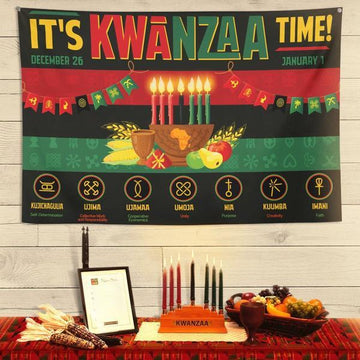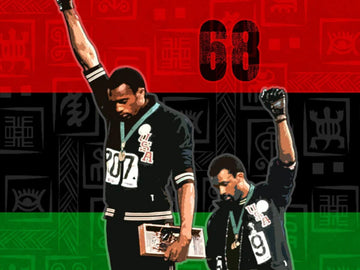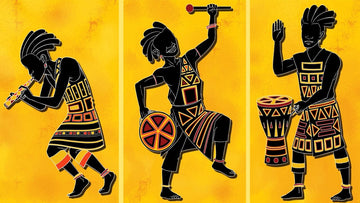Kwanzaa Celebrations: Comprehensive Day-By-Day Guide for Perfect Holiday
Nov 03, 2021

In the northern latitudes, we're in the heart of many wonderful winter festival gatherings. The blessing holiday season includes Christmas, Hanukkah, Three Kings Day, the New Year, and St. Lucia Day to be named some among many other things. Sparkling candles are lit, whether on a branch, in windows, or hanging from a candle holder, all symbolize the season of festivals and divine rituals. As a black person, let's not forget about Kwanzaa, a week-long celebration that commemorates Pan African heritage.
Kwanzaa - a holiday established in the mid-1960s to appreciate and contemplate African-American traditions and roots. Although it remains a virtually unknown celebration, it has grown to embrace the larger Pan-African diaspora in the decades afterward. Because numerous elements of the occasion are vague, it is challenging for today's young black folks to grasp how to celebrate.
Melaninful blog will offer you an A-to-Z guide to celebrating Kwanzaa most spiritually and joyfully possible. However, bear in mind that there is no one definite method to spend this occasion. As long as we continually remember the ideals of our origins every day; appreciate our ancestors and the sacrifices they've made, and seek to build and deepen our relationships in our community, the Kwanzaa spirit is immortal!
Happy reading!
Table of Contents
- Preparations
- Kwanzaa Day 1: December 26 - Day of Umoja
- Kwanzaa Day 2: December 27 - Day of Kujichagulia
- Kwanzaa Day 3: December 28 - Day of Ujima
- Kwanzaa Day 4: December 29 - Day of Ujamaa
- Kwanzaa Day 5: December 30 - Day of Nia
- Kwanzaa Day 6: December 31 - Day of Kuumba
- Kwanzaa Day 7: January 1 - Day of Imani
Preparations
Kwanzaa is usually observed for seven days, from December 26th until January 1st. The names are derived from the Swahili language, which was influential in the Pan-African movement of the 1960s and 1970s. However, because the majority of African-Americans have Western African ancestors, there are plenty of influences and customs from that region as well.
Every day, individuals who celebrate Kwanzaa greet each other with the words "Habari Gani?" or "What's the news?" and the other will answer appropriately based on the principle being recognized on that day.
Kwanzaa, on the other hand, traditionally includes a few key elements:
- Kinara (ceremonial candle holder); Misumaa Saba (seven candles representing the Seven Principles).
- Mazao, or fresh fruits that symbolize African first harvest fruit.
- Muhindi, also known as a cornfield, represents the succession of generations.
- Kikumbe cha Umoja, a cup of sharing in ancestor-honoring and treasuring ceremonies.
- All above things are placed on a Mkeka, or a mat adorned with traditional African designs.
You might also include:
- Nguzo Saba, or Seven Principles, poster
- Bendera, or pan-African flag designed in black, red, and green.
- Presents, literature, artwork, or traditional melody celebrating the Pan-African diaspora's culture.
Celebrate each of the 7 days of this fantastic African American holiday uniquely. Begin the happy celebration by arranging the Kwanzaa things in the most solemn and sacred place in your home. Decorate rooms with colorful images, bright posters, and banners. Enlighten your family with beautiful African sculptures to reflect the festive mood of Kwanzaa. A few Kwanzaa crafts and other decorations should be made to suit your personal interests and preferences.
Throughout the seven days of Kwanzaa, exclusive meanings and concepts of the Nguzo Saba are introduced. Each day, a fresh candle is lit to reflect one of Kwanzaa's concepts. Although there is no fixed procedure for burning the candle, most families delegate the task to the smallest family member. Some families, though, have a different opinion. Some households acknowledge the senior member by burning the candle in his/her honor.
Kwanzaa Day 1: December 26 - Day of Umoja
During the first day of the event, a black candle is lighted in the center of red and green candles in Kinara. It marks the beginning of the celebration that lasts 7 days. The person in charge of lighting the candle makes a declaration regarding the first principle, Umoja, or unity.
All families should attend to and appreciate the declaration so that they may jointly discuss the ideology and its significance. At times, that specific person will offer a chapter or poetry that is relevant to their lives and the concept in some manner.
“Surely, in a world ravaged and ruined by war, defined by division, oppression, and varied forms of greed, hatred, and hostility, the principle of Umoja (Unity) invites an alternative sense of solidarity, a peaceful togetherness as families, communities and fellow human beings.
It teaches us the oneness of our people, everywhere, the common ground of our humanity with others, and our shared status as possessors of dignity and divinity. But it also encourages us to feel at one with and in the world, to be constantly concerned about its health and wholeness, especially as we face the possibility of climate change and other disasters around the world.”
Dr. Maulana Karanga – The Founder of Kwanzaa
The Umoja (Unity Cup) filled with beverages is handed around to all the attendees in that gathering site to strive for and preserve oneness in the family, neighborhood, country, and race. Some households utilize a Unity cup for each individual present, while others just maintain a Unity cup in the center of the Kwanzaa table. After the process of distributing juice is completed, the candles are out till the following day.
Reflecting closely back over the last years, when there have been so many pressures attempting to cause controversy, it's clear to understand why this idea is more crucial than ever. The sheer fact that people are all living together and should always treat others fairly and equally. Many people believe that unity entails black people banding together to fight something, but this is also untrue. Umoja in Kwanzaa means to focus on the good, the uplifting, and the healing of the root values. What matters is that we continue to strive for unity, not only as a nebulous and ill-defined notion but as a practical, attainable daily aim.
Kwanzaa Day 2: December 27 - Day of Kujichagulia
The last outside red candle is lit after the black candle to indicate the second principle of Kwanza: Kujichagulia, or Self-Determination.
The celebration method for the second day is the same as the first. On the next morning, the individual who burns the candle delivers a message presented for the second rule. He or she then goes on to read a chapter or write a poem about that idea and explain how it relates to the purpose of their life. The Unity cup is passed around again, and the lights are snuffed.
The concept of self-determination, Kujichagulia, is the second element we discuss in Kwanzaa meanings. But what exactly is it?
African forefathers were forcibly removed from their homelands, and any connection they had to their civilizations was severed. Folktales, melodies, and stories preserved whatever culture remained. Since then, a significant element of the black experience has been the struggle to identify one's own identity.
The message for Monday is a reminder of how we view ourselves. All of the components of origins, ancestors, hardships, grief, loss, changes, and adaptations have contributed to the African American community's particular identity. Kujichagulia implies that you own an appropriate ability to shape your own identities. That's a lot of power, but it also comes with a lot of responsibility.
Consider who you want to be and how you can prepare to grow yourself from the ground up to reflect that. It's a lifetime process that may be challenging, perplexing, infuriating, and frightening. However, knowing that you must finally decide who you are, what is your true value may provide you with a huge source of power to win your own fight. Self-determination is a decision, an action, and a commitment, not merely an intention or a pronouncement.
Kwanzaa Day 3: December 28 - Day of Ujima
This is the moment to stress Kwanzaa's third tenet, Ujima, or Collective Work and Responsibility. On the third day, the candles are lighted anew, first with the black one, then the farthest left red one and the right green one. The gathered family members debate the significance of the third principle and share the Unity cup. At night, all the lights are dimmed.
In a word, Ujima means that what you are doing as an individual has an impact on the well-being of others. If you wish to transform societies for the betterment, you must first improve yourself. Every process necessitates hard effort and teamwork.
Ujima is the place where you must learn that labor and responsibility are the only ways to take your identity and win your own battle. The entire race is in jeopardy as long as one black individual is in difficulty. That's the charm of Ujima: you put in the effort, and you receive a community in return.
Aside from that, this command implies hard labor and investigation. It entails listening to experiences outside of one's comfort zone to comprehend what is required to achieve. It entails making errors and trying harder the following time to do it right. It entails completing the task because it needs to be done, rather than because there is an expectation of breakthrough achievement, recognition, or reward.
This idea, however, may be extended to cover everyone. Many of the issues that black people experience transcend race: wealth disparity, environmental degradation, authoritarian creep in our democratic process, hatred and prejudice, unfairness, and a changing work environment. A better world, not only for Afro-Americans but for all human beings.
The third day in Kwanzaa reminds people of community values and the importance of collective efforts. This is the time when the values of labor, love, support, and commonwealth of the community are upheld. This is a value that should be carried every day, not just during Kwanzaa.
Kwanzaa Day 4: December 29 - Day of Ujamaa
On the next day, the candle lighter will have to light 3 candles of the previous days in order and continue to light the adjacent red candle. This candle reflects the fourth Ujamaa principle or Collective Economics.
Attempts to narrow the economic and educational gap among black and white families have struggled with criticism at every stage. Racial schooling and economic inequality in the United States may be traced back to the slavery period, and there have been a variety of normative pressures aimed at sustaining the current system.
Ujamaa, the fourth pillar of Nguzo Saba's' cooperative economics,' is the concept of working together to improve our common level of living. With so many external institutional factors working against the black community's prosperity, black people must focus on doing everything they can to encourage community success.
Community support can be accomplished in several manners. The most common strategy is to help black fellows in their financial pursuits by purchasing from black-owned companies. Second, devote your time and money to programs, services, and organizations that assist individuals who are subjected to external pressures as a result of prejudice.
Of course, this does not simply apply to purchasing items with a black-favored perspective; it also applies to investing domestically. A functioning economy depends on the flow of capital from one location to another. This is more likely to happen with local small enterprises, regardless of who owns them. It's one practical and crucial component of Ujamaa; by investing in your local business, you share responsibility for its success.
During the last four days, we've trained to stand together for our community; we started to manage our identification; figured out ways to work diligently and accept accountability for community wealth; and we learned to collaborate with cultural, economic, and political influence for our own purpose.
Anything you can do to assist your local businesses is much appreciated. It benefits the entire society and strengthens bonds amongst people. Most significantly, it contributes to keeping people away from impoverishment, fearfulness, uninformed and separated conditions.
Kwanzaa Day 5: December 30 - Day of Nia
The Nia or Purpose candle, along with the preceding four lights that will be lighted on Thursday, is the second candle of hope. The manner in which lighting rituals are performed, beverages from Umoja are consumed, and concepts are discussed remains unchanged from the last days.
Nia, or Purpose, is the principle of the day. This is another of those hazy notions that might represent a variety of different things to a variety of different people, making it much more challenging to discuss. What setting should we put Nia in? How does it relate to the Nguzo Saba and African cultural identity in general?
When we look back at Black American history, we can see that when people come together for a common goal, so many things become possible – communities are revolutionized, liberties are gained, and self-image is regenerated. The greatest successes of black Americans have sprung from a feeling of purpose, a desire to do something. The success of the civil rights movement, the Harlem Renaissance, the Black Lives Matter protest, and Barack Obama's presidency all arose from that attitude of commitment.
Ask yourself these questions: What is my goal as an individual and as a group? What is the purpose of my life? What am I doing every day, in a tiny manner, to come closer to that goal? Again, your self-declaration image is often very distinct from how you actually manage your life manner. The pursuit of success always requires effort, patience, tolerance, and sacrifice. Even when we strive to live up to our highest ideals, who we picture ourselves to be is often quite different from who we end up becoming. Think about this idea as you light off the candle. Think about it for every second in your life.
Kwanzaa Day 6: December 31 - Day of Kuumba
The last day of the year falls on the 6th of Kwanzaa week, also referred to as Karamu or Kwanzaa feast day. For Black People, it is a very unique and historic day. When several family members bring their loved ones and friends, the mood of celebration skyrockets. Remember to ignite the preceding 5 candles as well as the 6th red candle.
Because of the large celebration with lovely guests, every household adorns home with customary Kwanzaa hues, especially on the sixth Kwanzaa day. The backdrop of African American music and traditional clothes should be in keeping with the Kwanzaa theme. The festivity includes special holiday foods. Delectable and spicy dis are always prepared for the feast.
Plays are performed during the meal, and family and friends recite passages and poetry linked to Kwanzaa's seven principles. A narrator takes center stage at the banquet. The day's emphasis should be on creativity. The decorations and dishes have been painstakingly created (the majority of them are handmade) from previous days. While the Unity cup is shared, current members commemorate their forefathers. After everyone has finished their drink and food, the candles are extinguished.
Tamshi La Tutaonana, written by Dr. Karenga, the Kwanzaa founder, is recited by the eldest member of those present before the Karamu rite concludes. This is the feast's and the year's last statement. Everyone closes the Karamu by chanting "Harambee!" seven times.
Today's Kwanzaa spirit is one of innovation and pleasure. Africa is a land full of legends. They have contributed significantly to humanity's creative expression, from traditional tales passed down verbally through generations of families to poetry, songs, novels, and other stories portrayed through the kaleidoscope of the diaspora experience.
Kwanzaa Day 7: January 1 - Day of Imani
On the final day of Kwanzaa, all of the candles were lighted (still in order as usual). The last green candle signifies Imani, or Faith, the seventh Kwanzaa theme.
Because faith is such a fuzzy notion, it's difficult to discuss. If you're a Christian or a Muslim, faith is believing in a higher power as well as the righteousness of the commandments as outlined in sacred scriptures.
However, I do not believe Kwanzaa encourages religious ideas because it was designed to commemorate culture rather than religion. Furthermore, in contrast to the preceding six principles, this belief appears to be focused on the underlying values of the person and the community rather than a specific religion. It is faith in the virtues of the past and hope for better things in the future.
Faith is required to move our ideas forward. Recognizing and appreciating divinity is one of the most significant ways we can put our religion into action – every connection we have with someone else is another chance to connect to the divine spark within our fellow humans. That is the essence of all celebrations.
The last day of Kwanzaa is also a family and upbringing holiday. On this day, presents are prepared in advance, with the majority of them being inspired by old history and historic legends. The children will be given this present and will have a discussion with their parents about the importance of giving and receiving great lessons about love, trust, and other wonderful things.
That concludes the Kwanzaa week trip. Enjoy your moment!
----------------
Perhaps initially, Kwanzaa was created to assert the separation of African-American festive culture from the rest of the United States. However, over time, Kwanzaa has become a great opportunity for African Americans and even non-Afro people to learn the values of their African ancestors and connect with good old traditions.
Kwanzaa is not a dominant difference, it is a pure holiday for enjoying fun and food, celebrating deep values , and showing affection for one another. The whole meaning of Kwanzaa week is to rediscover the precious legacies of ancestors, share the hard-won perspective and wisdom that has grown out of the shared cultural experience. Kwanzaa centers people at the end of the year reminds the true value of people and community.
The 7 Kwanzaa principles to be commemorated have proven to be true and never out-of-date on our modern world. Make the most of your Kwanzaa week with your family and celebrate its precious values. And don't forget to implement these rules, not only on Kwanzaa day but on a daily basis to make the world a better place.




